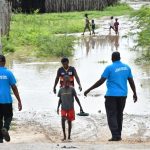Africa was centre stage in the 2023 Ashden Awards with four of the five global South winners being African low carbon innovators and one receiving an Outstanding Achievement Award. Three more were from the UK.
Winners from Kenya, Nigeria, Uganda and Cameroon were celebrated for driving radical progress in tackling the biggest climate challenges – working in clean energy, natural climate solutions and agriculture.
The 2023 Ashden Awards, which took place at the Royal Geographical Society in London, honoured work supporting marginalised communities, and those at greatest risk from the climate crisis.
Winners included USAFI Green Energy in north west Kenya, which brings affordable clean energy and jobs to people living in Kakuma refugee camp, as well as the local community. Another winner was CERAF-Nord, which supports communities in the north of Cameroon to restore degraded land through agroforestry and bee-keeping.
The importance of boosting jobs and skills was a key criteria in the awards. In the Powering Futures in Clean Energy category, Burasolutions Solar Academy in Nigeria was celebrated for training women and marginalised people to join the clean energy workforce.
The Ashden Award for Integrated Energy Africa was won by Power for All, for its Utilities 2.0 Twaake project in Uganda. Husk Power Systems received the Outstanding Achievement Award for its work rapidly expanding community solar minigrids in Africa and Asia.
Husk previously won an Ashden Award in 2011 for its work bringing clean energy to 180,000 rice farmers in Eastern India. Just over a decade later, their massive growth demonstrates what’s possible when clean energy pioneers get the backing they need. The company aim to add more than 1,400 new minigrids with a projected 300,000 new connections over the next five years, and last month announced it had secured an equity and debt investment worth more than US$100 million – the largest-ever equity raise in the minigrid industry.
Collectives for Integrated Livelihoods Initiatives (Clnl) was a winner from India. Clnl helps women in India’s Central Tribal Belt use clean energy to raise their incomes – and become leaders in their communities.
Ashden Award winners also included three organisations from the UK. All receive grants, global publicity, and connection to funders, investors and partners that can help them create even more impact.
“Brilliant solutions need backing”
Ashden CEO Dr. Ashok Sinha said: “Our winners prove that people are passionate about creating practical solutions to the climate emergency – whether using clean energy to power up a thriving business in Uganda or giving their time to restore rivers in the UK. And just look what happens as a result: higher incomes, better health, stronger communities and the creation of new jobs.
“But these brilliant solutions need serious backing from policymakers and investors. The Global South is still waiting for promised climate finance. Our international winners are powering up farms and refugee camps, creating jobs for a clean energy future, and protecting threatened rainforests. It’s vital that increased funding reaches these climate heroes.”
Ashden Award winners and runners up included:
Ashden Award for Powering Futures in Clean Energy - Building the workforce to energise the Global South. Supported by LinkedIn
Burasolutions Solar Academy, Nigeria
Burasolutions Solar Academy in Nigeria boosts skills and pathways to work for women and marginalised people, with support for innovation and entrepreneurship.
Runner up: Fondazione ACRA – Senegal – supports marginalised women in rural Senegal to launch solar-powered businesses, with training and access to products and finance.
Ashden Award for Integrated Energy Africa - Boosting the continent’s clean energy pioneers. Supported by Integrate to Zero
WINNER – Power for All – Uganda
In Uganda, Power For All’s Utilities 2.0 Twaake project unites centralised and decentralised renewable energy companies to achieve faster and cheaper electrification, boost rural livelihoods, and end energy poverty.
Runner up – Husk Power – Nigeria
Ashden Award for Powering Refugees and Displaced People – Taking on the humanitarian energy crisis
Award delivered in partnership with Global Refugee Network. Supported by NextEnergy Foundation, The Linbury Trust, JAC Trust, The Alan & Babette Sainsbury Charitable Fund.
WINNER – USAFI Green – Kenya
USAFI Green manufactures and supplies affordable, low-carbon cookstoves in Kenya’s Kakuma Refugee Camp – creating work and improving health for displaced people and host communities.
Runner up – Care for Social Welfare International – Nigeria – uses clean energy to bring much-needed light and water to a camp for displaced people.
Ashden Award for Powering Agriculture - Tackling hunger and poverty in the Global South. Supported by the UK Department for Energy Security and Net Zero
WINNER – Collectives for Integrated Livelihoods Initiatives (CInI) – India
CInI helps women in India’s Central Tribal Belt use clean energy to raise their incomes – and become leaders in their communities.
Runner up: Mobility for Africa – Zimbabwe – provides transport for rural women through custom-built electric ‘hambas’ tricycles.
Ashden Award for Natural Climate Solutions – Defending and empowering Indigenous communities
Supported by the UK Department for Energy Security and Net Zero
WINNER – CERAF-NORD, Cameroon
CERAF-NORD supports communities around Benue National Park, and in the north of Cameroon, to restore degraded land through agroforestry and bee-keeping.
Runner up: ECA-Amarakaeri, Peru – supports people to earn a sustainable living and to monitor and report illegal logging and mining.





